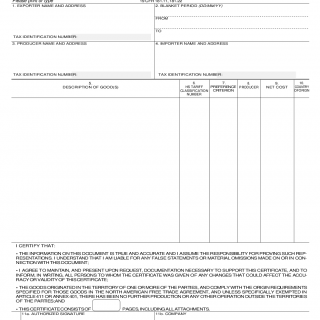NAFTA Certificate of Origin
The NAFTA Certificate of Origin is a document that verifies that certain goods being exported from Canada, the United States or Mexico qualify for the preferential tariff provisions of the North American Free Trade Agreement (NAFTA).
This certificate is required when exporting from any of the three countries to the others, and must be presented to the customs authority of the importing country.
It consists of two copies, with each copy signed by the exporter or producer. The form requires information about the exporter, producer, importer, and the product being shipped. The certificate must be prepared in English, French, or Spanish, and in some cases may require additional language translations.
The advantages of using the NAFTA Certificate of Origin are that it helps to reduce or eliminate tariffs on goods that meet the NAFTA rules of origin, thereby increasing trade between the three countries. It allows exporters to take advantage of the lower tariffs offered by NAFTA, which in turn can lower costs and make prices more competitive.
However, if the form is filled out incorrectly or incompletely, it can cause delays at the border and result in penalties, fines or seizure of the goods. It's important to ensure that all information is provided accurately, and that the goods meet the NAFTA rules of origin.
The NAFTA Certificate of Origin has legal significance, as it states that the details provided on the form are true and correct, and the exporter is responsible for any inaccuracies or misrepresentations made. It may also be subject to review by customs authorities and auditing bodies.

